Olugbenga Owolabi – He Left Nigeria In His 20s, Abducted And Killed On His Return In His 50s. The Horrific Story Of Ogbomoso Hotelier
Neusroom’s Michael Orodare writes about the 55-year-old Nigerian-American businessman killed in Nigeria on his return to invest in the country.

Written by Michael Orodare for Neusroom
September 13, 2022
It was evening on Thursday, July 28, 2022. The fury of the day’s sun had passed, and business activities were gradually winding down. Suddenly, the air at Tana Suites in Abaa, a community along Ogbomoso-Ilorin expressway in the Surulere local government area of Oyo State, was rent with noise. For a brief spell, panic and pandemonium reigned, and those who attempted to scamper to safety were immediately held hostage by two gunmen.
“Where is the director?” The men demanded.
The staffers immediately identified the gun-baring men to be those who had been at the hotel in the afternoon in the guise of enquiring about lodging. The men had also sat for a few minutes for some bottles of drinks after their enquiry.
Olugbenga Owolabi, the hotel owner, “heard the noise because they were banging at the gate. Then he came out and identified himself as the director,” his elder brother, Ayorinde Owolabi, told me on Tuesday, August 24, 2022. “Gbenga was not even wearing any shoes.”
The gunmen whisked him away with one of his staff – Rachael Opadele, a 21-year-old final year student of Ladoke Akintola University of Technology (LAUTECH), shut out of school by the Academic Staff Union of Universities (ASUU) strike.
Rachael, who took up the job to keep herself busy, had served the gunmen drinks during their visit in the afternoon.
Soon, like a prairie fire, word went around the community that gunmen had invaded Tana Suites.
“I got a call from someone in the neighbourhood that there was a robbery incident around Tana. The caller advised I call Rachael immediately to confirm if she was fine. I called, and her number was unreachable. I decided to go to the hotel with her brother. Then the staff told us she was kidnapped with the owner. That was how the problem started since that night,” Grace Opadele, Rachael’s mother, who’s just recovering from the death of her husband in December 2021, told Neusroom during a visit to Abaa, Ogbomoso, on Saturday, August 27, 2022.
Owolabi’s abduction gained national prominence after call recordings of his brother, Ayorinde’s negotiation with the bandits went viral on the internet on Saturday, August 6, 2022.
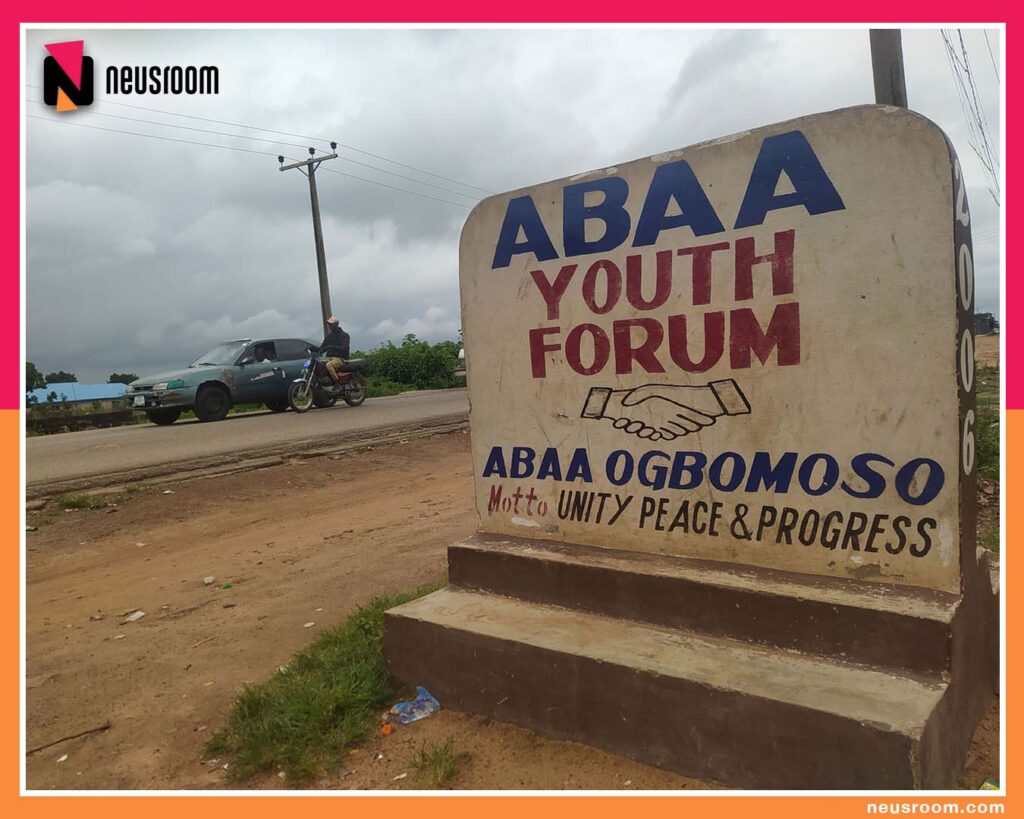
Abaa Community (Oyo State, Southwest, Nigeria) is about 250km away from the Lagos International Airport and 18km away from Kwara state in the Northcentral, the region with the second-highest number of murders and abductions in the first quarter of 2022. Photo: Olamide Fawole for Neusroom.
“I’m dying tonight. How much have you been able to raise? My hands have been tied, blood is no longer flowing,” Owolabi could be heard crying for help in the disturbing viral audio.
“Ogbeni, I no go sleep here today, I go kill this baba to go. Sebi, the money is for baba. Is it your money?” one of the bandits interjected in pidgin English. (Mr, I won’t sleep here tonight. I will kill this man and leave, is the money not for the man, is it your money?)
Ayorinde responded: “We’ve only been able to raise ₦1.4m; by tomorrow, we hope to be able to raise ₦2m and bring it to you.”
“You and that ₦2 million, God go punish you,” the bandit quipped.
The bandit then switched to a corrupt version of Yoruba: “Do you know how many years it took us to trail him before we abducted him that night?
“His life is invaluable to me. If I kill him today, I’ll abduct someone else tomorrow. If the ₦50 million is short of ₦5, I won’t take it.”
When the family sent ₦5m to the bandits on Tuesday, August 2, 2022, Owolabi, Rachael, and the motorcycle rider, Idowu Ajagbe, who took the ransom to the bandits’ hideout didn’t make it out alive. They were all killed.

Ogbomoso residents protest kidnapping and killing of Owolabi, Rachael and Ajagbe, Monday, August 8, 2022. Photo: Ogbomoso Entertainment News.
This is the story of Olugbenga Owolabi, who left Nigeria in his early 20s but got abducted and killed at 55 on his return to invest in the country.
From Lagos to Canada & U.S.
From his days at the Federal Government College (FGC) in Ogbomoso, the same school that produced the likes of late Nigerian singer, Olanrewaju ‘Sound Sultan’ Fasasi, Engr Joseph Tegbe, a former governorship aspirant in Oyo state who is said to be Owolabi’s classmate, among many others, Ayorinde said: “once he (Gbenga) commits his interest into something, he would go for it and do it successfully.”
Born March 10, 1967, in Togo, during his parents’ missionary assignment in the country, Owolabi, the fifth of Late Rev Dr J.O and Grace Owolabi’s children, was raised in a mission house with his five other siblings.
“Our father was one of the black missionaries that took Baptist mission to Ghana in 1953. He returned to Nigeria to marry in 1955,” Ayorinde, his elder brother, told me.
After his encounter with Rev Wagaman, an American preacher, Owolabi packed his bags and headed for Canada. That was in 1989, six years after leaving FGC Ogbomoso in 1983.
“Our father organised a crusade in Lagos, and one Reverend Wagaman, a white man from Canada, was involved, and he loved his (Gbenga’s) role. He was always on the typewriter and the organ. So Wagaman invited him and followed it up to the point he got to Canada,” Ayorinde, a retired Deputy Director in the Federal Ministry of Education, told me.
His brother told me he spent only a year in Canada before moving to the U.S in 1990, where he met his spouse Folasade, raising a family and living for more than three decades before considering moving back to Nigeria.
During his short time in Canada, his digital footprints revealed that he studied Information Systems at Humber College, in Toronto, Canada. I approached Humber College for confirmation via email, the school did not respond.
Owolabi had worked as a Sales and Marketing Financial Analyst at Alpharma Inc, a leading pharmaceutical company in the U.S. In 2002, he left Alpharma for Cyhosting Corporation, which he incorporated in Maryland in May 2000. By January 2009, he had floated Tanatek Inc, a website design and tech company in Maryland, and served as its CEO until his death.

FGC Ogbomoso, one of Nigeria’s 104 Unity Schools, established to foster unity among young Nigerians. Photo: worldsorg.com.
“He was a hard-working man, very dedicated to the business and his family as well,” Goran Radeski, a Macedonian who worked with Owolabi at Tanatek as a Senior Graphic/Web Designer, told me from his base in North Macedonia, on Wednesday, September 7, 2022.
Although they never met in person for the three years they worked together after meeting on an online platform in 2012, Radeski described Owolabi as one of the best people he has worked with to date. “Very friendly and easy to work with, easy to talk to about any matter, both private and professional.”
In his years in the U.S., Owolabi never lost touch with his family in Nigeria. And as he grew older, the desire to return to Nigeria increased.
“He had planned that in the next ten years, he would end up in Nigeria and also encouraged his children to come to Nigeria,” his brother said.
A series of business ventures was to herald his return. He invested in hospitality with Tana Suites which he started building six years ago and opened in December 2021. He also invested in agribusiness with 190 acres of farmland in Ogbin and Ijesa, near Otte, in Kwara state, Northcentral Nigeria. Before his death, Tana Suites and Tana Farms were hiring to fill more than ten positions, according to the companies’ social media pages.
Although originally from Fiditi, a small town between Ibadan and Oyo in the Afijo LGA of Oyo State, Owolabi chose to cite Tana Suites in Ogbomoso, the town that bears some significance to his trajectory.
Ogbomoso holds a crucial place in the history of the Baptist mission in Nigeria, serving as the launchpad to spread the mission up north. The mission took Owolabi’s father to Togo, where he was born. Through the church, he met Wagaman, who took him to Canada in the late 1980s.
“Our maternal grandmother is also from Ogbomoso. Our mother’s sister also married an Ogbomoso man. So he was quite close to that family,” Ayorinde told me.
Owolabi returned to Nigeria on July 20, 2022, and was kidnapped at the hotel in Ogbomoso, on July 28, 2022. His family may have been numb with shock over his abduction, but to the people of the area, cases of kidnappings have been on the rise in recent times.
The Nigeria Security Tracker (NST), a project of the Council on Foreign Relations (CFR), revealed that 36 of 1,484 people abducted in Nigeria between January and March 2022 were from the Southwest.
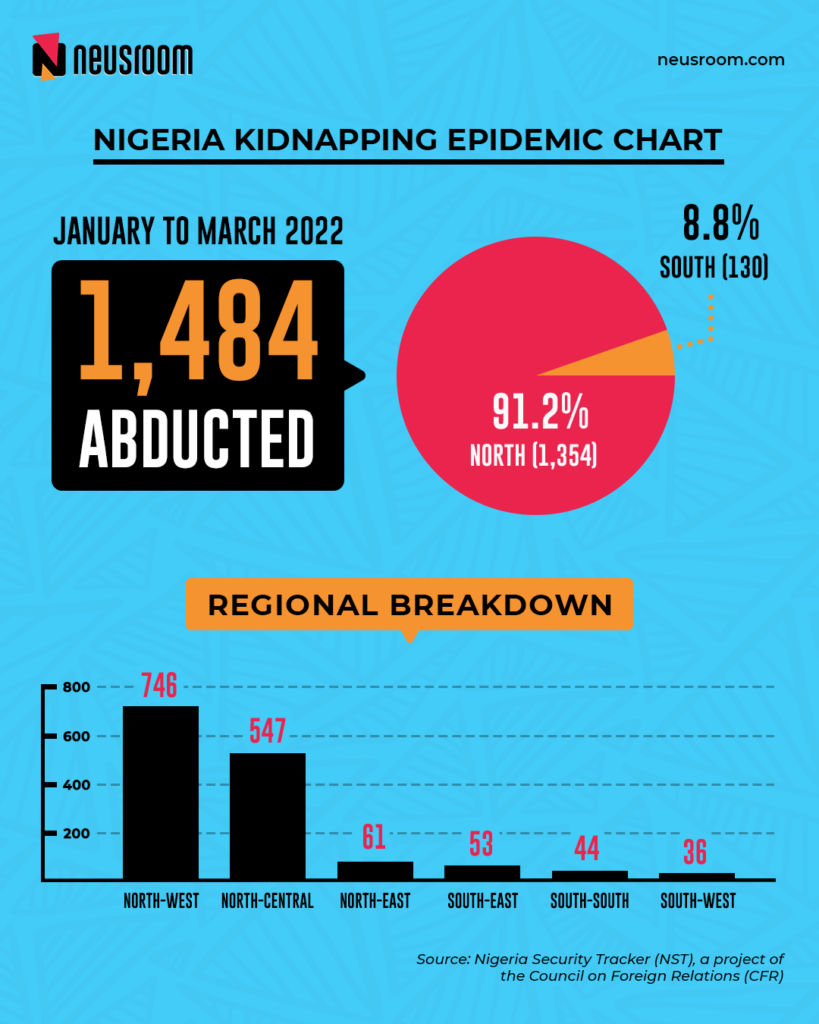
Nigeria has seen a disturbing rise in kidnapping, killings and banditry across the country since 2015. Designer: Tonte Briggs.
On Saturday, July 16, 2022, Christopher Bakare, the Supervisor of a farm owned by former Oyo governor, late Adebayo Alao-Akala, was abducted in Jabata, Surulere LGA. He was released on July 20, after his family paid ₦5 million in ransom. Two days after his release, Dr Rasheed Oladoye, owner of Titilayo Hospital in Gbede (boundary community between Oyo and Kwara State), also in Surulere LGA, was abducted on July 22 at his clinic. When Oladoye was released on July 26 after paying a ransom, Owolabi and Rachael were abducted on July 28 in Abaa, Surulere LGA.
Ayorinde believes the same syndicate masterminded the three abductions in Gbede, Jabata and Abaa all in Surulere LGA, under 14 days.
“I compared notes with the man who negotiated the release of Akala’s farm supervisor, and it was the same pattern,” he said.
“After the doctor was released on Wednesday, two of the bandits were in my brother’s hotel in the afternoon on the 28th day of July. They just said they wanted to look at what the rooms looked like and the cost, and then they had drinks. Around 7:45 pm, they came with guns in the same dress they wore in the afternoon and held them captive. The girl (Rachael) that served them in the afternoon was the same girl they took away.”
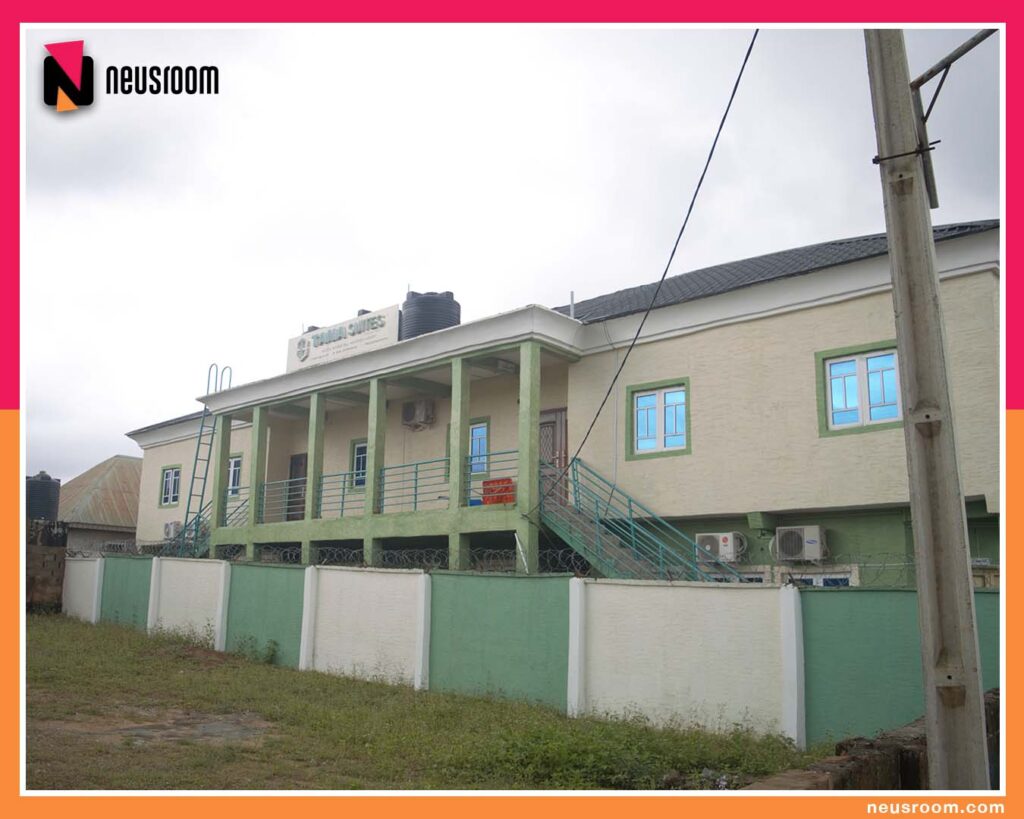
Opened officially in December 2021, business activities have been grounded at Tana Suites since Owolabi’s abduction on July 28, 2022. Photo: Olamide Fawole for Neusroom.
“So where is the CCTV footage?” I asked with excitement, hoping it would make the work of security operatives easier in tracking the bandits.
“The CCTV got spoilt, and he was trying to put it in order. He had told somebody to come and work on it just a few days before that time. The person was yet to find time to respond, so that was the security snag,” his brother told me.
I cringed with rage.
Ransom Bearers Became Victims
On Tuesday, August 2, 2022, the Alabaa of Abaa, Oba Bolarinwa Ayanpoju, assigned two volunteers, Idowu Ajagbe, an Okada rider and Kunle (not real name) to take ₦5m ransom to the bandits. (Neusroom is not using his real name because community members fear retribution from the bandits).
“After receiving ₦5m, they took the rider’s Okada, his money and his phone. They moved them to where my brother was and asked him if he knew them. He said no. After counting the money, they matched all of them (Owolabi, Racheal, Kunle and the okada rider) to their slaughter slab. They stopped speaking pidgin English and started speaking Fufude. After speaking Fufude, they shot them. Unfortunately for them, the courier man (Kunle) is a ‘solid man’, so to say so. He escaped miraculously,” Ayorinde said.
The President of Ogbomoso Community Youth Forum (OCYF), Rev Peter Olaleye, told me he gathered that Kunle also sustained gunshot injuries from the attack.
Rachael’s mother said the bandits “called me with Racheal’s phone around 11 pm on Tuesday, saying ‘the money we asked for, and you couldn’t provide, go and use it to throw a party. You will see your daughter tomorrow’. Which means they had been killed at that time.”
After escaping, Kunle wandered through the bush in the pale light of the moon until he got to an area where he could borrow a phone to make a call. While wandering, he confirmed he heard the bandits searching around with the motorcycle after discovering he had disappeared from the point they were shot.
“Around 12 am, while we were having a vigil, I got a distress call from the Kabiesi. The courier man had called him with another person’s phone. We called Amotekun, Police and Operation Burst. Amotekun and Operation Burst came, and we went to pick Kunle; then we all headed to the police station to seek the Police assistance to evacuate the victims, take them to the hospital and try to bring them back to life. But the Police didn’t cooperate. We were there till 3 am, and they asked us to come back in the morning,” Ayorinde said.
“That was when I learned that Amotekun and the Soldiers had to report to the police station within the vicinity of a crime before taking action.”
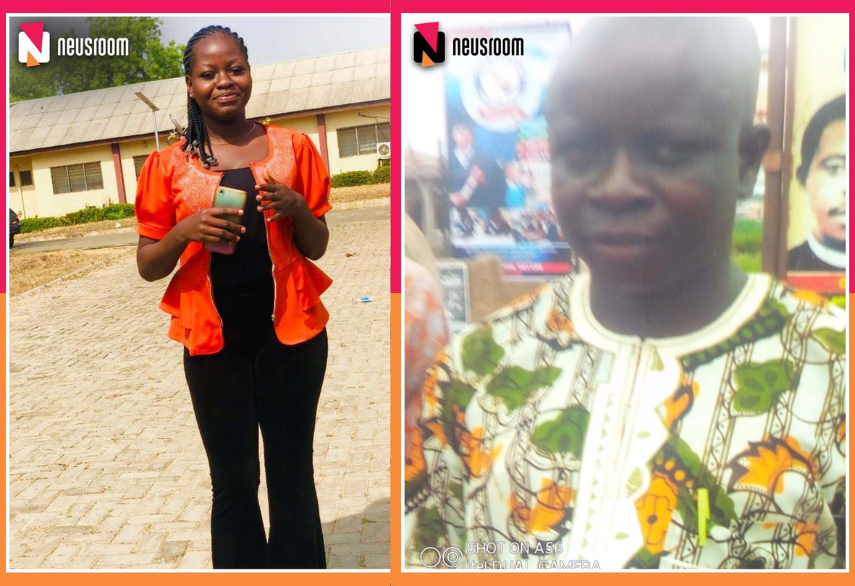
The killing of Rachael and Ajagbe, who are both members of the First Baptist Church, Abaa, has left their families in despair. Photo: Family.
The next morning when they got to the scene, what they saw sent a wave of terror through their bodies – the macheted bodies of Owolabi, Rachael and Idowu. Kunle said they were not macheted at the time they were shot before he escaped. His escape must have prompted their action.
“Maybe they would have survived if we had gone there earlier,” Owolabi’s brother told me.
The Kabiesi’s wife told us he was unavailable to speak when we visited his palace twice on Saturday, August 27, 2022. I was also told Kunle was unavailable for security reasons.
The Bandits Among Us
From my conversation with community members, I understand the bandits may have lived in the area for some time because they could speak Yoruba, the predominant language in Southwest Nigeria, but were not fluent.
“When I called Gbenga and attempted to speak Yoruba to him, they interjected and responded in Yoruba, but it was a corrupt version,” Ayorinde said.
Rachael’s mother also told me the bandits spoke Yoruba to her when they called, “but their Yoruba was not clear. It had the Fulani intonation in it.”
Olaleye, the Ogbomoso Youth President, also confirmed that the masterminds may have lived in the area.
“They could speak Yoruba, which suggests they must have been living around the community for some time. There’s also a likely conspiracy of an insider for the operation to succeed,” he told me.
Days after the killing, which was pinned on bandits suspected to be Fulani from the Northern part of Nigeria, reports went viral that one Femi Owolabi masterminded the killing.
“The Oyo State Police Command had paraded five suspects in relation to the murder, among which is Femi Owolabi, his immediate younger brother. In his confession statement, Femi blamed the incident on Satan. He will be charged to court soon,” the report posted on Arewa Republic Facebook page read.
Ayorinde debunked the report and told me it was an attempt to divert attention from the main suspects, who he claimed are Fulanis.

Screen grabs from the Arewa Republic Facebook page detail when the page was created, location of its admin, the fake post about Owolabi’s death and reviews from users tagging the page’s posts as fake and divisive. Photo: Facebook/Michael Orodare.
I reviewed the page. It was created in June 2020 and has received many negative reviews from users calling on Facebook to shut it down for spreading falsehood and misinformation to divide the country.
Olugbenga Owolabi: A rallying point
Described as a dogged businessman and a rallying point for his family, Owolabi became another victim of Nigeria’s rising insecurity, forcing many young people out of the country in droves.
Radeski, who worked with Owolabi for three years, said he was very religious and devoted to God and church.
“I think this was the most important thing for him. He was ambitious, hard working man, but always put family and God before anything else.”
In the last ten years, Nigeria has been battling a surge in the kidnapping epidemic, with over ₦13bn paid as ransom between June 2011 and July 11, 2022. A bill imposing a 15-year jail term for payment of a ransom to kidnappers and the death penalty where abduction leads to the victim’s death, which the Nigerian Senate passed in April 2022, has not deterred bandits.
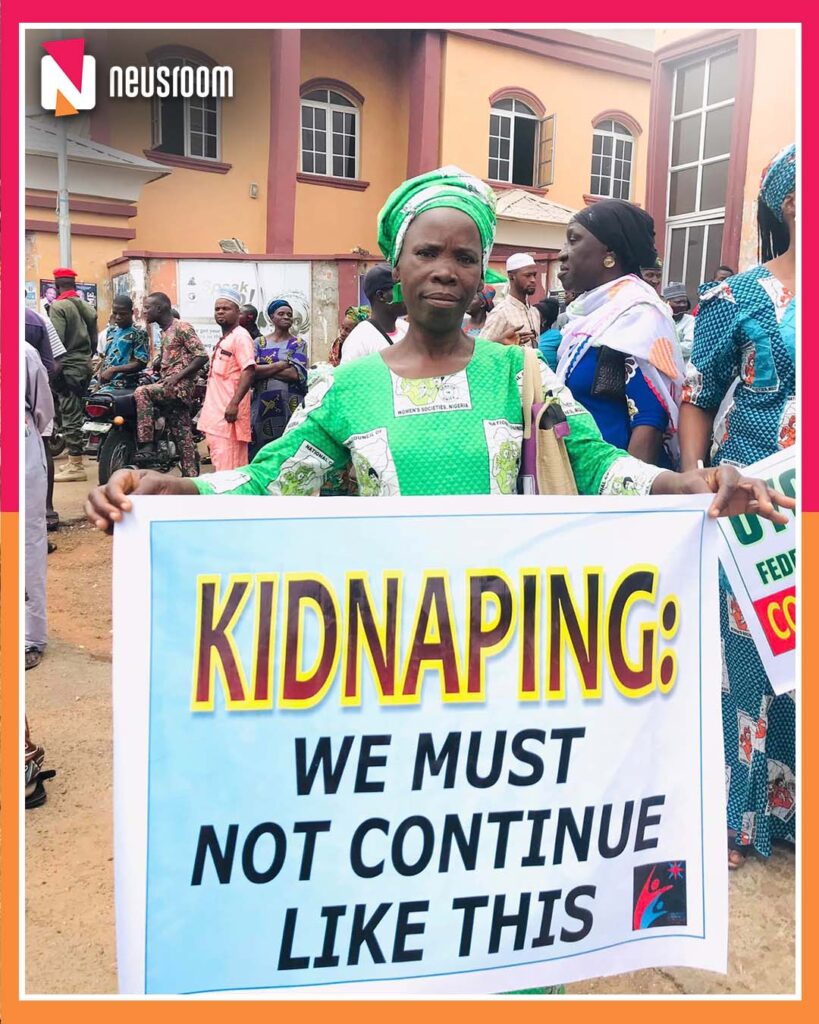
A senior citizen joins the protest against kidnapping in Ogbomoso, on Monday, August 8, 2022. Photo: Ogbomoso Entertainment News.
Ogbomoso town is also experiencing a surge in the attacks, the type that shot Igangan town in Oyo State into the national limelight after Dr Fatai Aborode, a UK-based businessman, was killed while returning from his farm in Igangan in December 2020. Like Igangan, Ogbomoso residents also claimed Fulani herders were responsible for the attacks.
Olaleye said, “this is happening because Ogbomoso is the borderline between the south and north, and we tolerate everyone, allowing them to live among us peacefully.”
When Fulani jihadists from Ilorin attempted to extend their conquest into Yorubaland in the 19th Century through the Ogbomoso axis, the Ogbomoso army prevented them from attacking the Old Oyo Empire, now part of Southwest Nigeria. Due to Ogbomoso’s historical survival and military conquest, the people of the town boast of a tradition of strong and unbroken defence.
This belief birthed the popular saying ‘Ogun kò jà jà jà, kó kó Ogbomoso’ (which loosely means, Ogbomoso cannot be conquered).
Olaleye said Ogbomoso youths are ready to defend their town without breaking the law.
“We are setting up a civilian JTF and equipping OPC and vigilantes groups to secure our land,” he told me.
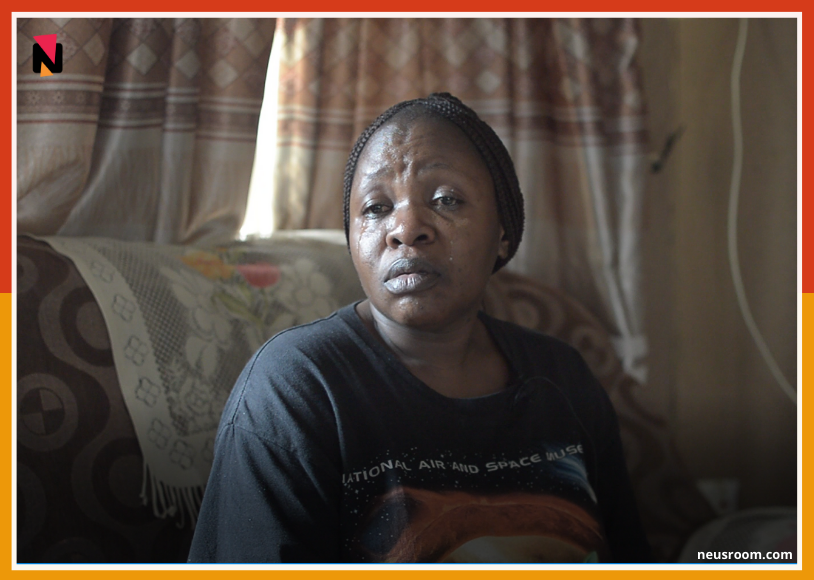
Rachael’s Mom, Grace Opadele, still recovering from her husband’s death in December 2021, lost her eldest child in August. 2022 Photo: Olamide Fawole for Neusroom.
The 2020 Global Terrorism Index (GTI) says Fulani extremists were responsible for 26% of terror-related deaths in Nigeria in 2019. The rising cases of kidnapping and banditry across the country forced southwest governors to set up a local security network – Amotekun, in 2019, but the outfit appears to be overwhelmed by the security crisis.
The Commandant of Amotekun in Oyo State, Col. Olayinka Olayanju, did not respond to the message sent to him on WhatsApp after reading. He also didn’t pick up my calls.
It’s been more than 30 days since the ‘Ogbomoso three’ were killed.
“Investigation is still in progress. You would be provided updates accordingly,” the Oyo Police PRO, Adewale Osifeso, wrote in response to an SMS and WhatsApp message I sent to him on Wednesday, August 31, 2022.
Owolabi’s family said his death had robbed the family of a bridge builder, a rallying point and an unapologetic giver.
The U.S. Government
Ayorinde told me the U.S. Consulate in Nigeria has taken over the case, with the victim being a U.S citizen and plans to repatriate his remains to the U.S. for burial, where his wife and four children live.

‘Olu was kind and professional from the start,’ Radeski. Photo: Facebook/Olugbenga Owolabi.
I sent an email to the U.S. Consulate in Nigeria and the Nigeria Desk at the Bureau of African Affairs, U.S. Department of State in Washington DC, to understand what they are doing to address Owolabi’s murder, but they are yet to respond.
Hope for Diasporan Nigerians?
Data from the World Bank revealed that Nigerians in diaspora remitted $84.53bn in four years – $24.31bn in 2018, $23.81bn in 2019, $17.21bn in 2020 and $19.2bn in 2021, contributing about 6% to the GDP. The 2021 remittance was four times the Foreign Direct Investment (FDI) inflows recorded in 2021. However, the rising cases of abduction and killing of locals and those who return to Nigeria to set up businesses expected to address the rising unemployment may continue to deter many diasporan Nigerians with plans to invest in the country.

Dr Fatai Aborode (left), killed in Oyo state in December 2020 and Dr Chinelo Megafu (right) killed by bandits in the Abuja-Kaduna train attack in March 2022, are some of the prominent victims of Nigeria’s rising insecurity.
The killing of Aborode in December 2020; Prince Eloniyo Abuda, an American-based Nigerian, found dead five days after he was abducted in Edo State in February 2021; Bolanle Aworetan Omojuwa, killed along Lagos-Ibadan expressway, in August 2021, days after arriving Nigeria from the UK for her mother’s funeral, and now Olugbenga Owolabi, among many others, may continue to scare many Nigerians from returning to the country.
ALSO WATCH:
Story: Michael Orodare
Infographics and Cover Design: Tonte Briggs
Stringer: Samuel Adebayo
Photos: Olamide Fawole


One Comment